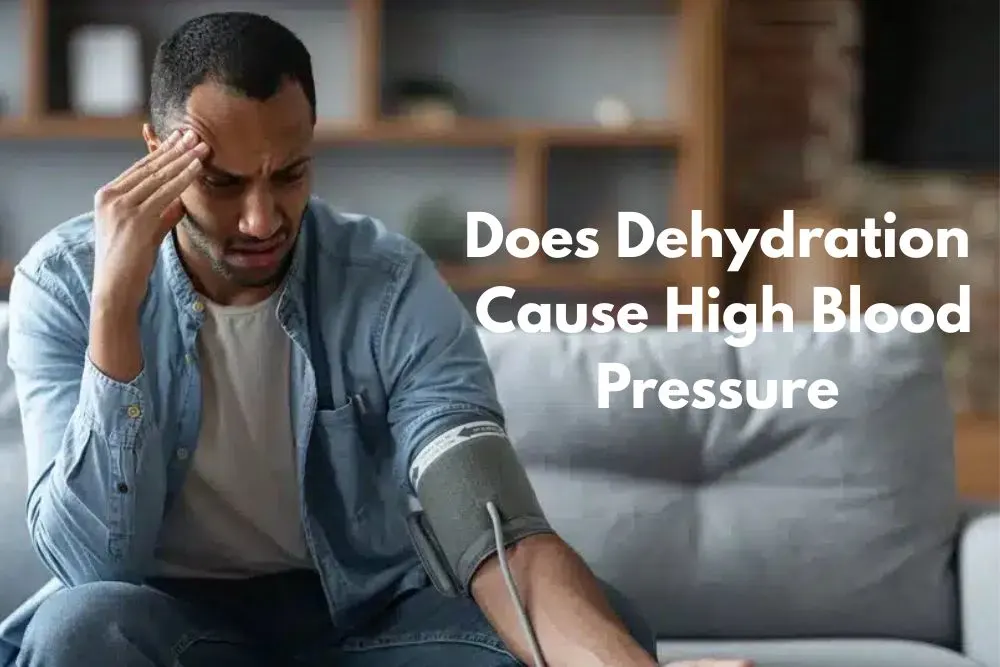Blog
Does Dehydration Cause High Blood Pressure?

You probably know that most of us don’t drink enough water. But what does it mean if not drinking enough water makes you feel more tired or dizzy? What if that’s actually making your blood pressure higher than normal? The connection between high blood pressure and not having enough water in the body might surprise you, but the fact that dehydration is connected with high blood pressure is true.
Surprisingly, dehydration and high blood pressure are closely linked. Cutting back on water while consuming energy drinks or soda will not be beneficial for you. If that is you, this is something you need to think about.
Let’s clarify a few things by looking at the research and trying to understand what happens in your body when there is a depletion of fluids.
What Exactly Happens When You’re Dehydrated
In simple terms, when the body becomes dehydrated, it means the human body is lacking water. We mention water here because it is important of all our functions which include, the brain, heart, kidneys and blood vessels.
In the case of dehydration occurring, your body will attempt to preserve as much liquid as it can. Why, you may ask? As water is fundamental for a number of operations within the body, additional water will help slow down blood flow making vessels less stressed. Hypertension aka high blood pressure will cease to exist while strength of fluids/hormones such as adrenaline can help in overcoming syrup.
Like, hydration and dehydration has massive benefits on the body. Considering that dehydration affects blood flow, it’s understandable that the force of blood in arteries increases. That’s blood pressure inflating. Imagine your body using less fluid and still managing to circulate it everywhere!
Amlopres TL Tablet is now on Meds4go — trusted, effective, and affordable 👉 Buy Amlopres TL Now
The Role of Sodium, Hormones, and Your Kidneys
The Role of Sodium, Hormones, and Your Kidneys
Dehydration impacts your salt equilibrium too. In the absence of water, your sodium levels can rise. Elevated sodium is a well known cause for increased blood pressure.
Along with that, your kidneys enter the picture. They control how much fluid and electrolytes there are. In case of dehydration, the kidneys retain water and send signals to increase blood pressure to try and stabilize the situation. Hormones such as vasopressin and aldosterone are released which also cause blood vessels to tighten, increasing blood pressure.
So yes – while your body is trying to balance fluids, it has a lot of survival mechanisms to rely on. If dehydration becomes a common factor, those mechanisms will pose side effects.
What Research Says
Research is ongoing, especially concerning the long-term impacts, but the data indicates low hydration most definitely correlates with increased blood pressure.
A study published in the journal Hypertension Research found out that the acute increases in blood pressure may be linked to dehydration. This sharp rise is most noticeable among people with borderline hypertension or those sensitive to salt.
Similarly, another paper from The American Journal of Physiology indicated that cardiovascular abilities and blood pressure can rise due to mild dehydration—loss of 1-2% body weight from water.
While dehydration is not the sole cause of hypertension, it is without a doubt a major contributor if experienced often.
Symptoms of Dehydration
People are suspected to be mildly dehydrated whilst completely unaware. Signs indicating mild dehydration include:
- Headaches
- To put it mildly, craving salty foods
- Dizziness or lightheadedness
- Dry skin
- Fatigue or low energy
- Bad breath or dry mouth
- Urinating for hours or dark yellow urine
If you frequently catch yourself experiencing these symptoms, consider changing your hydration routine.
How much water should should be really drinking?
Most people have heard the rule of “8 glasses a day,” but it’s not one-size-fits-all. A more accurate guide is:
– Men: About 3.7 liters (125 oz) per day
– Women: About 2.7 liters (91 oz) per day
(Source: National Academies of Sciences, Engineering, and Medicine)
That includes water from food and other beverages too, but plain water is still the best. If you’re sweating more, exercising, or living in a hot place, you’ll need to drink even more.
Tips to stay hydrated without putting too much thought into it
- You lose fluids while sleeping. Rehydrating right after waking up allows yo to feel energized for your day.
- When water is within reach, you are more likely to sip on it more often throughout the day.
- Foods like cucumbers, watermelon, oranges, and lettuce are delicious and nutritious while also having high water volume.
- Both drinks have dehydrating effects, so regard them with caution and a healthy dose of water.
- Water infused with lemon, cucumber, or mint makes the boring habit of drinking water a little bit more exciting.
Does Dehydration Cause High Blood Pressure?
That’s right—particularly in the short term. Dehydration results in the thickening of blood, raising sodium levels in the body, increasing blood vessel constriction, and increasing the release of stress hormones. All of these factors lead to elevated blood pressure.
If you already have severe cases of high blood pressure, hydration is one method to support heart health. For people who are healthy, hydration helps maintain balance with energy, concentration, skin, and yes—even blood pressure.
Final Thoughts
There are various ways to develop high blood pressure. The factors are not always as straightforward as they seem. The lack of adequate water intake is one such reason. The most important aspect here is that it can be easily solved.
Pay attention to how your body feels and make sure to keep a water bottle with you at all times. Your heart will appreciate it.

